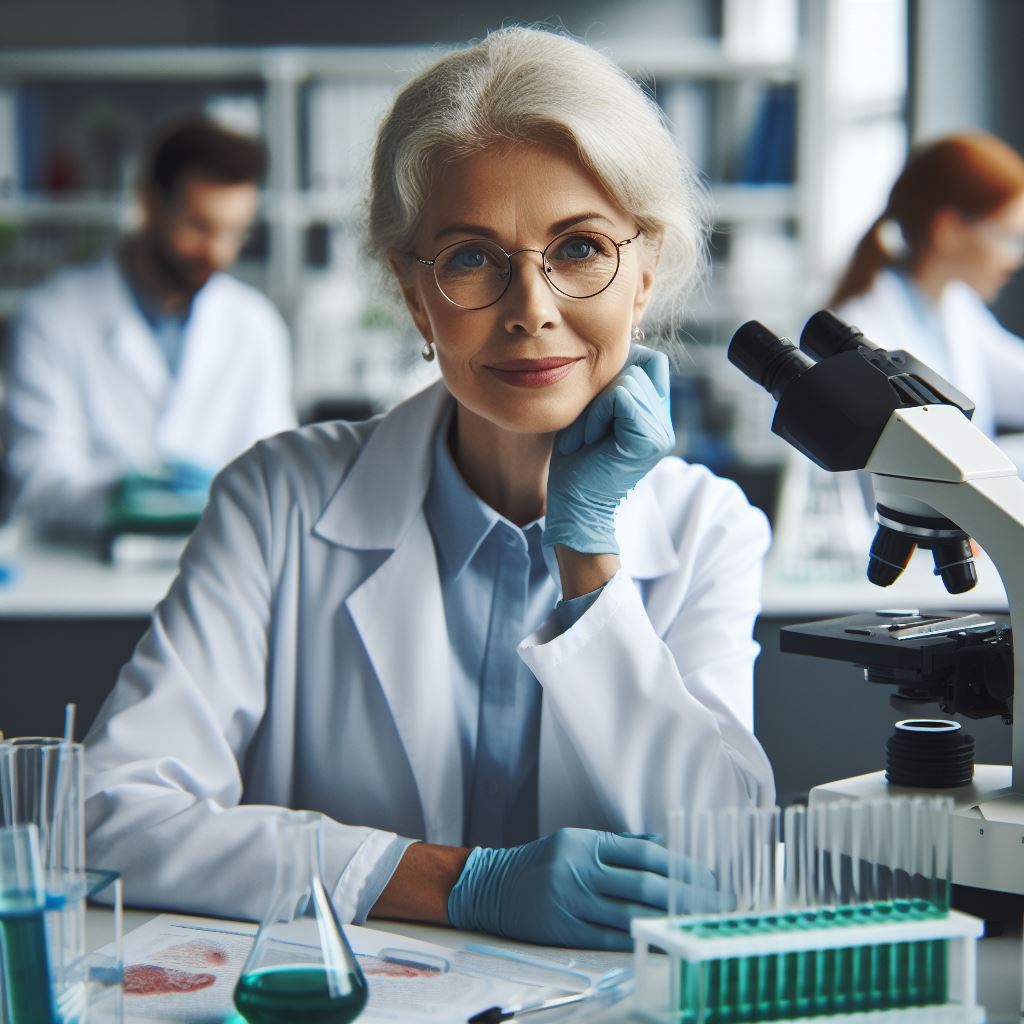Introduction
Stereotypes, preconceived notions that often oversimplify and generalize, have the power to shape our perceptions of various professions.
In the realm of careers, these stereotypes can be limiting, constraining our understanding and appreciation of the diverse roles individuals within a particular field may play.
Chemists, in particular, find themselves subject to such stereotypical assumptions, often confined to the image of scientists confined within laboratory settings.
This blog section seeks to unravel and challenge these stereotypes, aiming to broaden the narrative surrounding chemists.
Beyond the traditional lab coat and test tubes, chemists play dynamic roles across industries and sectors.
From environmental sustainability and policy advocacy to entrepreneurship and education, their impact transcends the laboratory.
By shedding light on the multifaceted nature of chemists’ contributions.
This exploration endeavors to break down limiting stereotypes and encourage a more nuanced appreciation of the diverse and vital roles chemists play in shaping our world.
Join us in challenging assumptions and embracing the breadth of possibilities that exist beyond the conventional image of chemists confined solely to laboratory spaces.
Breaking Stereotypes: Chemists Beyond the Lab
Overview of Chemists
Chemistry is a scientific field that focuses on the study of matter, its properties, and the changes it undergoes.
Chemists are professionals who work in various industries, conducting research and applying their knowledge to solve real-world problems.
Roles and Responsibilities of Chemists
- Research and Development: Chemists play a crucial role in developing new products, materials, and technologies. They work in laboratories, conducting experiments and analyzing data to discover innovative solutions.
- Quality Control: Chemists ensure that products meet specific standards and regulations. They perform tests to determine the purity, stability, and safety of chemicals and pharmaceuticals, ensuring that they are fit for consumption or use.
- Environmental Analysis: Chemists help monitor and analyze the impact of human activities on the environment. They study pollution levels, assess the quality of water and air, and develop strategies to minimize or mitigate environmental damage.
- Forensic Science: Chemists assist in criminal investigations by analyzing physical evidence such as fingerprints, DNA, and substances found at crime scenes. They use their expertise to identify and analyze trace evidence, aiding in the resolution of crimes.
- Pharmaceutical Development: Chemists play a key role in the development of drugs and medications. They design and synthesize new compounds, test their efficacy, and ensure their safety for human use.
- Teaching and Education: Many chemists work in academia, teaching students and conducting research in universities and colleges. They impart knowledge, mentor aspiring chemists, and contribute to further advancements in the field.
Importance of Chemistry in Various Industries
- Pharmaceuticals: Chemistry is vital in the development and production of life-saving drugs and medications. Chemists contribute to drug discovery, formulation, and quality control to ensure effective and safe treatments.
- Materials Science: Chemists help develop new materials with enhanced properties, such as lightweight and durable metals, strong and flexible plastics, and advanced composites. These materials find applications in industries like aerospace, automotive, and electronics.
- Energy Production: Chemistry plays a significant role in energy production and storage. Chemists contribute to the development of efficient batteries, renewable energy technologies, and fuel cells, helping to mitigate climate change and shift towards a greener future.
- Food and Agriculture: Chemists contribute to the development of safe and nutritious food products. They analyze food samples for quality, develop food preservatives, and create pesticides that are effective yet environmentally friendly.
- Environmental Science: Chemistry is crucial in understanding and mitigating environmental issues such as pollution, climate change, and waste management. Chemists help develop sustainable practices, cleaner technologies, and waste reduction strategies.
Basically, chemists are not confined to the lab but have diverse roles and responsibilities across various industries.
Their expertise is essential for scientific advancements, product development, and addressing critical societal challenges.
The importance of chemistry spans across industries, contributing to advancements in healthcare, materials science, energy production, and environmental conservation.
Breaking stereotypes, chemists are actively shaping the world we live in and making a positive impact on society.
Chemists in Research and Development
Explanation of their role in developing new products
Chemists in Research and Development play a crucial role in developing new products.
They are the driving force behind innovation and creativity in various industries, including pharmaceutical companies, cosmetics, and food industries.
Chemists working in pharmaceutical companies, cosmetics, and food industries
In pharmaceutical companies, chemists in Research and Development are responsible for discovering new drugs and improving existing ones.
They conduct extensive research to identify compounds that can effectively treat diseases and enhance patient outcomes.
These chemists work tirelessly to ensure the safety, effectiveness, and quality of drugs before they reach the market.
Similarly, in the cosmetics industry, chemists in Research and Development are involved in formulating new products and improving existing ones.
They combine various ingredients to create innovative skincare, haircare, and makeup products that meet the ever-changing demands of consumers.
These chemists focus not only on enhancing the aesthetic appeal of the products but also on their efficacy and safety.
In the food industry, chemists in Research and Development play a vital role in creating new flavors, textures, and nutritional profiles.
They develop innovative food products by utilizing their knowledge of chemistry and food science.
These chemists work closely with food technologists to ensure that the final products are safe, delicious, and meet the required nutritional standards.
The role of chemists in Research and Development is not limited to formulating products. They also contribute to process optimization and quality control.
They constantly strive to improve production methods, reduce costs, and enhance the overall efficiency of manufacturing processes.
Their expertise in chemistry allows them to identify potential issues and suggest solutions to ensure the smooth operation of the production line.
The creativity and innovation required in this field
The work of chemists in Research and Development requires a high level of creativity and innovation.
They need to think outside the box to come up with novel ideas and solutions.
They constantly research and stay updated with the latest advancements in their field to incorporate new techniques and technologies into their work.
This constant drive for innovation is necessary to stay ahead in the highly competitive industries they operate in.
Chemists in Research and Development also collaborate with other professionals, such as biologists, engineers, and marketers, to bring their ideas to fruition.
They work in multidisciplinary teams to ensure that the final product not only meets technical requirements but is also commercially viable.
This collaborative approach enables them to combine their expertise and skills to create truly groundbreaking products.
In review, chemists in Research and Development are instrumental in developing new products in various industries.
Their role extends beyond the lab as they contribute to improving the quality of life for consumers.
Their work requires a mix of creativity, innovation, and technical knowledge, making them indispensable in driving advancements in pharmaceuticals, cosmetics, and the food industry.
Read: Biologist: Freelance vs Institution Roles
Chemists in Environmental Conservation
Chemists play a vital role in addressing environmental issues by utilizing their expertise and knowledge of chemicals.
They actively contribute to various aspects of environmental conservation, such as pollution control, waste management, and sustainable development.
Let’s delve into the significant contributions of chemists in preserving our environment.
Pollution Control
Chemists actively engage in developing innovative solutions and technologies to control and reduce pollution.
They conduct extensive research to identify and analyze pollutants, their sources, and their impact on the environment.
By understanding the chemical composition and behavior of pollutants, they can devise effective strategies to prevent, mitigate, and eliminate pollution.
Waste Management
In the field of waste management, chemists play a crucial role in devising methods to treat and dispose of hazardous and non-hazardous wastes.
They are involved in designing efficient recycling processes that help reduce the burden on landfills and conserve valuable resources.
Chemists also develop techniques to safely handle toxic substances and ensure proper disposal to prevent harm to the environment and human health.
Sustainable Development
Chemists contribute significantly to sustainable development by promoting the use of environmentally friendly materials and processes.
They strive to develop alternative energy sources, such as solar cells, fuel cells, and biofuels, that minimize the reliance on fossil fuels and reduce greenhouse gas emissions.
Chemists also work towards developing eco-friendly products and manufacturing processes that minimize waste generation and promote resource conservation.
Personalized UK Career Consulting
Receive tailored career guidance designed just for you. Get actionable steps and expert support to boost your career in 1-3 days. Take control of your career now.
Get StartedWater Treatment
Water is a vital resource, and chemists play a fundamental role in ensuring its quality and safety.
They develop efficient methods and technologies for water treatment, including filtration, disinfection, and desalination.
Chemists analyze water samples to detect pollutants, assess water quality, and recommend appropriate treatment methods.
Their expertise ensures that our water resources are protected and safe for consumption.
Environmental Monitoring
Chemists are instrumental in monitoring and assessing environmental conditions to identify potential risks and provide timely solutions.
They develop and implement analytical methods to measure and quantify pollutants in air, water, soil, and biological samples.
By accurately monitoring environmental parameters, chemists help authorities in making informed decisions to protect ecosystems and human health.
Policy and Regulation
Chemists play a critical role in shaping environmental policies and regulations.
Through their research and expertise, they provide valuable insights for policymakers to develop effective strategies for environmental conservation.
Chemists contribute to setting standards and guidelines related to chemical safety, emission limits, waste disposal, and the use of environmentally harmful substances.
Generally, chemists go beyond the lab to actively contribute to environmental conservation.
Their involvement in pollution control, waste management, sustainable development, water treatment, environmental monitoring, and policy-making is essential for preserving our planet.
By utilizing their knowledge and expertise in chemistry, they strive to create a sustainable and eco-friendly future for the benefit of all.
Read: Grants and Funding for UK Biologists

Chemists in Healthcare
Chemists play a crucial role in healthcare settings, contributing to medical research, drug development, and patient care.
Exploring the role of chemists in healthcare settings
Chemists in healthcare settings are involved in various aspects of patient care. They work closely with doctors and other healthcare professionals to ensure the safe and effective use of pharmaceuticals.
Discussing their contribution to medical research
Chemists are at the forefront of medical research, constantly striving to discover new drugs and therapies. They employ their expertise in chemistry to develop innovative treatments for various diseases.
Drug development and innovation
Chemists work diligently to develop new drugs that can address unmet medical needs.
They design and synthesize chemical compounds, assess their pharmacological properties, and optimize their efficacy and safety profiles.
Ensuring drug safety and efficacy
Chemists play a pivotal role in ensuring the safety and efficacy of medicines. They conduct extensive testing to identify potential side effects and interactions, paving the way for better patient outcomes.
Advancing personalized medicine
Chemists are instrumental in advancing personalized medicine, tailoring treatments to individual patients’ needs.
Through the analysis of genetic data and biomarkers, they can develop targeted therapies that are more effective and have fewer side effects.
Improving diagnostics and medical devices
Chemists are involved in the development of diagnostic tests and medical devices.
They design and create sensors and instruments that enable accurate and rapid diagnosis of diseases, leading to early intervention and better prognosis.
Collaborating with other healthcare professionals
Chemists collaborate with doctors, pharmacists, and other healthcare professionals to deliver comprehensive care. Their expertise in chemistry provides a unique perspective on patient treatment and care plans.
Bridging the gap between science and healthcare
Chemists serve as a bridge between scientific advancements and healthcare practice.
They translate complex scientific knowledge into practical applications, making it accessible and beneficial for patients and healthcare providers.
Impact of chemistry on improving healthcare outcomes
Chemistry has had a significant impact on healthcare outcomes.
The development of life-saving drugs, innovative therapies, and advanced diagnostic techniques has revolutionized patient care and improved outcomes for countless individuals.
Your Dream Job Starts with a Perfect CV
Get a tailored CV and cover letter that captures your unique strengths and stands out in your industry. Let us help you make an unforgettable first impression.
Get StartedFuture prospects and challenges
Chemists in healthcare face ongoing challenges, such as the rising cost of drug development, the need for faster and more efficient research methodologies.
And the ethical considerations surrounding new technologies.
However, the potential for further breakthroughs and advancements remains substantial.
In essence, chemists in healthcare are essential for advancing medical research, developing new drugs, and improving patient care.
Through their expertise in chemistry, they contribute to the overall well-being and outcomes of individuals worldwide.
The continued collaboration between chemists and other healthcare professionals will undoubtedly lead to further advancements in healthcare.
Read: UK Biologists and COVID-19 Research
Learn More: The Role of Research Labs in the UK
You Might Also Like: Day in the Life of a UK Environmental Scientist
Chemists in Education and Outreach
Chemists play a crucial role in education and outreach, going beyond their traditional lab work. They actively engage in teaching and promoting scientific literacy to future generations.
Exploring the role of chemists in educating future generations
- Chemists serve as educators, bringing their expertise to universities and schools.
- They create and deliver chemistry courses, ensuring students receive a solid foundation in the subject.
- Chemists inspire and motivate students to pursue careers in the field of chemistry.
- They design innovative teaching methods and materials to enhance the learning experience.
- Chemists encourage critical thinking, problem-solving, and analytical skills development.
- They promote practical applications of chemistry in everyday life, making the subject more relatable.
Discussing chemists’ involvement in teaching chemistry at universities and schools
- Chemists often hold teaching positions at universities, sharing their knowledge with aspiring scientists.
- They develop curricula, design experiments, and conduct practical sessions to reinforce theoretical concepts.
- Chemists mentor students, providing guidance and helping them navigate the challenges of studying chemistry.
- They contribute to the development of educational policies and programs to improve chemistry education.
- Chemists collaborate with other educators, sharing best practices and advancing teaching methodologies.
- They continuously update their knowledge and stay abreast of the latest research to deliver high-quality education.
Highlighting chemists’ contribution to public outreach programs to promote scientific literacy
- Chemists actively participate in public outreach programs to increase scientific awareness.
- They organize chemistry demonstrations and presentations to engage and inspire the general public.
- Chemists explain complex scientific concepts in a simplified and accessible manner to non-experts.
- They conduct interactive activities that allow people of all ages to explore chemistry hands-on.
- Chemists collaborate with museums, science centers, and community organizations to bring chemistry to the public.
- They address misconceptions and debunk myths surrounding chemistry, fostering scientific literacy.
To conclude, chemists go beyond their lab roles by actively contributing to education and outreach.
They educate future generations by teaching at universities and schools, enhancing learning experiences, and promoting practical applications of chemistry.
Moreover, they engage in public outreach programs, inspiring scientific curiosity and dispelling misconceptions.
Chemists play a vital role in shaping the next generation of scientists and fostering scientific literacy for the broader public.
Read: Networking Tips for UK-Based Biologists
Uncover the Details: Top UK Universities for Aspiring Biologists
Conclusion
In wrapping up our exploration, it’s evident that chemists extend far beyond traditional stereotypes, playing vital roles in diverse arenas.
From environmental stewardship to educational advocacy, their contributions resonate across sectors.
Breaking free from the limiting perceptions confined to laboratory settings, chemists showcase versatility and innovation.
Emphasizing the need to shatter stereotypes, we underscore the importance of recognizing the dynamic nature of the chemistry profession.
These individuals are not merely confined to laboratory spaces but actively engage in addressing global challenges and shaping the world around us.
As readers, we encourage you to appreciate the multifaceted roles of chemists.
By understanding and valuing their contributions beyond the lab, we contribute to dispelling outdated stereotypes.
Let’s celebrate the breadth of possibilities and the significant impact these professionals have in various facets of our lives.
In doing so, we pave the way for a more inclusive and accurate perception of the indispensable role played by chemists in our society.




